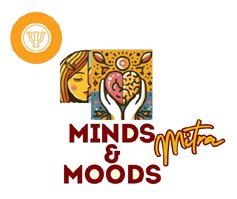Mending the Bond: A Guide to Marriage Counselling 💍
Marriage counselling, also known as couple therapy or relationship counselling, is a specialized form of psychotherapy designed to help married couples work through conflicts, improve communication, and strengthen their relationship. A skilled psychotherapist or mental health counsellor provides a neutral and safe space for both partners to explore their concerns, gain new perspectives, and learn effective strategies for relating to each other. It is not about assigning blame but about helping two people reconnect and build a healthier partnership.
A Trusted Professional in Nagpur: Rrimi Bodalkar
For couples in Nagpur seeking to strengthen their relationship, Rrimi Bodalkar, a Sr. Psychotherapist / Mental Health Counsellor, is a highly qualified professional. Holding an M.A. in Psychology (Counselling) and a PGDMH (Clinical), she has the expertise to address complex relationship dynamics. Her specialization in CBT, REBT & DBT (Specialised) provides her with a powerful set of tools to help couples manage negative thinking patterns, regulate their emotions, and communicate more effectively. As an NSDC Certified professional in Psychometric Analysis & Learning Style Assessment, she is well-equipped to help partners understand each other’s unique psychological makeups, ensuring a more holistic and successful outcome.
Why Seek Marriage Counselling? Symptoms & Causes
It is a common misconception that marriage counselling is only for couples on the verge of divorce. In fact, it is a powerful tool for preventing issues from escalating and for deepening an already healthy connection. The symptoms that often suggest a need for professional guidance include:
- Communication Breakdown: You and your spouse constantly argue, or, conversely, you no longer communicate at all. This can be a sign of deeper issues that require counselling.
- Erosion of Trust: Dealing with the aftermath of infidelity, financial deception, or other breaches of trust. Rebuilding trust often requires intensive personal counselling and couples work.
- Persistent Conflicts: You find yourselves having the same arguments over and over again without a resolution. This can lead to anger management counselling if not addressed.
- Emotional Distance: You feel disconnected from your spouse, a lack of intimacy, or a sense of emotional emptiness in the relationship.
- Major Life Transitions: Navigating significant changes such as a new baby (parenting support counsellor), a job loss (workplace stress counselling), or a new phase of life.
The causes of these issues can be a combination of poor communication skills, unresolved individual issues, and differing values or expectations. Sometimes, a history of trauma or an unmanaged mood disorder in one or both partners can be the root cause of the relational conflict.
The Procedure of Treatment: A Collaborative Journey
The procedure of treatment for marriage counselling is a collaborative and goal-oriented process that focuses on the dynamics between the partners.
- Initial Assessment: The therapist will meet with both partners, sometimes individually and sometimes together, to understand the history of the relationship, the presenting issues, and each person’s perspective. The therapist may use a Personality assessment or other Psychometric Analysis tools to understand the unique traits of each partner.
- Identifying Negative Cycles: A core part of marriage counselling is helping the couple identify the negative cycles of interaction they are stuck in. For example, one partner may withdraw when the other gets angry, creating a pattern that leads to more conflict.
- Skill Building: The couple learns and practices new, healthier ways of communicating and interacting. This can include:
- Active Listening: Learning to truly hear and understand each other’s perspectives without interruption.
- Emotional Regulation: Using techniques from Cognitive Behavioral Therapy (CBT) or Dialectical Behavior Therapy (DBT) to manage intense emotions during arguments.
- Conflict Resolution: Learning to express needs and concerns in a constructive, rather than destructive, way.
- Rebuilding Connection: The therapist guides the couple in reconnecting on an emotional and physical level, helping them rebuild trust, intimacy, and a sense of partnership. This is a core part of the procedure of treatment.
Frequently Asked Questions (FAQ’s)
Q1: How is marriage counselling different from individual therapy?
A: Marriage counselling focuses on the dynamic between two people, whereas individual therapy focuses on a single person’s thoughts and behaviors. However, a good therapist will recognize that both are often interconnected.
Q2: Will the counsellor choose a side in our arguments?
A: No. A skilled psychotherapist remains neutral and impartial. Their role is not to assign blame but to help the couple understand their negative patterns and work toward a healthier way of relating to each other.
Q3: Can marriage counselling help with anger management?
A: Yes. Many conflicts in relationships are fueled by unmanaged anger. Marriage counselling often includes components of anger management counselling to help both partners learn to express their anger in a healthier way.
Q4: Is it a sign of weakness to seek help for my marriage?
A: On the contrary, it’s a sign of strength and commitment. Seeking counselling shows a dedication to your partner and a willingness to put in the work to make the relationship last.
Q5: What if my partner doesn’t want to go to counselling?
A: You can still benefit from personal counselling on your own. A therapist can help you understand your role in the relationship’s dynamics and teach you new communication skills that may still have a positive impact on your partner and the relationship as a whole.

